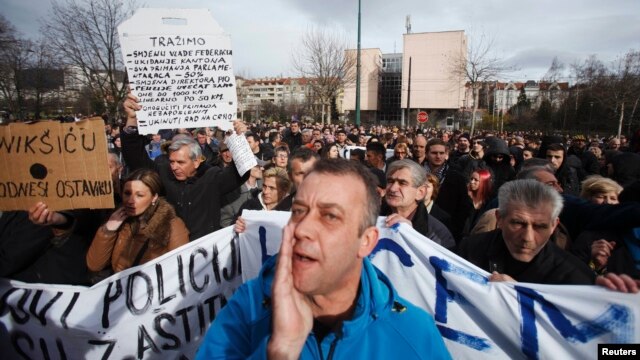Bosnian protesters demand local leaders resign
| Publisher | Radio Free Europe/Radio Liberty |
| Publication Date | 10 February 2014 |
| Cite as | Radio Free Europe/Radio Liberty, Bosnian protesters demand local leaders resign, 10 February 2014, available at: https://www.refworld.org/docid/5331456112.html [accessed 27 May 2023] |
| Disclaimer | This is not a UNHCR publication. UNHCR is not responsible for, nor does it necessarily endorse, its content. Any views expressed are solely those of the author or publisher and do not necessarily reflect those of UNHCR, the United Nations or its Member States. |
February 10, 2014
By RFE/RL's Balkan Service
 Antigovernment protesters rally in front of a government building in Sarajevo on February 10.
Antigovernment protesters rally in front of a government building in Sarajevo on February 10.
SARAJEVO – Thousands have continued protests in Bosnia-Herzegovina against unemployment, poverty, and corruption.
The protests, which turned violent last week, are the worst social unrest in the country since the end of the 1992-95 war.
Protesters in Sarajevo and other cities across the country on February 10 demanded the resignation of regional and local leaders whom they blame for economic hardship and corruption.
RFE/RL's correspondent in Sarajevo says several hundred people gathered outside the government headquarters in the capital.
There were also protests in Mostar, Tuzla, and at least five other towns. They were mostly peaceful.
In the northern city of Tuzla, where the protests began last week, a protester told RFE/RL: "[The politicians] have been doing whatever they want for two years. We are asking for resignations. They destroyed our factories, they turned our kids into hooligans and it's time all of that stopped."
Protesters have also called for early elections and a new government of nonpartisan experts.
More than 300 people were injured during protests last week that also saw government buildings set on fire.
Bosnia has an official unemployment rate of nearly 40 percent, poverty is widespread, and corruption is allegedly rampant.
The country's economic problems are compounded by a complex postwar political structure of ethnic power sharing.
Dodik Blames Bosniaks
The current protests have been concentrated mostly in the Muslim-Croat Federation, but there have also been demonstrations in the Bosnian Serb entity, the Republika Srpska.
Republika Srpska President Milorad Dodik, on a visit to Belgrade on February 9, claimed Bosniak organizations were behind the protests in his region.
"Organizations involved in staging the protests [in Republika Srpska] are mainly Bosniak or they are some structures connected to the [Muslim-Croat] Federation," Dodik said.
"That is how it was in Banja Luka and that is how it is today in Bijeljina."
Dragana Dardic, head of the Helsinki Citizens' Assembly NGO in Banja Luka, denied Dodik's allegations.
"If everything is all right in Republika Srpska, if we have just milk and honey [in that half of Bosnia], if each of us has at least 1,500 BAM ($1,040), which is the amount needed to buy basic necessities – then why is our leadership in a panic?" she asked.
The European Union on February 10 urged Bosnian politicians to show "leadership" by initiating reforms that would allow the country to emerge from the economic and political crises that have fueled the protests.
With reporting by Reuters, dpa, and B92
Link to original story on RFE/RL website
